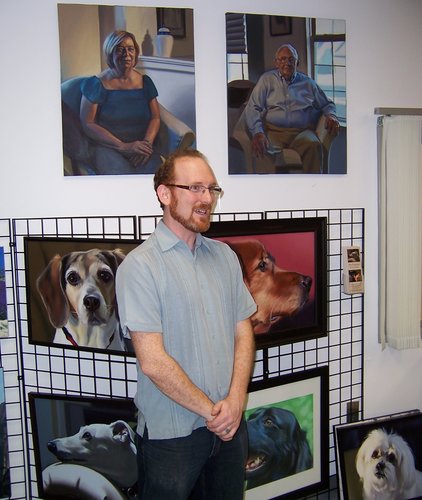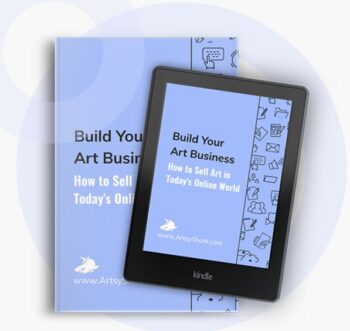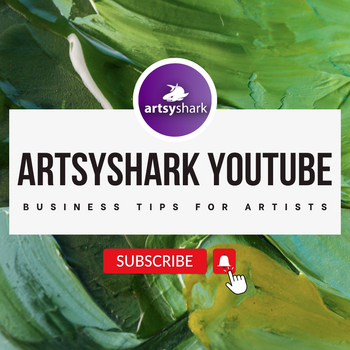by Carolyn Edlund
People want to buy art from experts, not amateurs. How can you share your expertise and gain credibility as an artist?

Painter and teacher Glen Kessler speaks about his art at an open studio event.
The good news is that you are already an expert about your own artwork. You know more than anyone else about what inspires you, how you make what you make, and the message your work shares with the world.
But what defines an expert? You cannot be an expert at everything; people are known for areas of expertise. Take a close look at your own area of expertise. How would you define it? What are you truly passionate about, and truly excellent at doing?
Find your niche
Artists who are recognized as experts usually have a niche to focus on. They become a specialist in an area of their choosing. Go deeply into your own chosen direction, exploring it fully. As you do, you will find new ways to express yourself, and develop a mature, signature style that comes with practice. When a portfolio has “some of this and some of that” it doesn’t send a clear message that resonates. A portfolio with a strong consistent direction conveys expertise more effectively.
Visual presentation
Your portfolio reflects the breadth and depth of your work, and how serious you are about your work. Is it large enough to make a presentation that is robust and consistent? Do all of the pieces in your portfolio work together synergistically to make the result even more powerful?
But it’s not only about the artwork itself. When you use outstanding images of your art on your website and in your marketing materials, it helps to establish that you are operating on a professional level. In this way, you build credibility and authority through the visual experience of your art.
Communication is key
Credibility is also established by the way you communicate about your expertise. Did you invent a technique? Have you written a book, or an article about your art? Do you teach? How do you do what you do? Why are you especially good at it? As an artist, you should work toward being able to speak clearly about what you do. Know the concept behind your work and what is fascinating about it. How will you tell others in writing and verbally about your art?
Your online presence
Your website can also show the authority you hold in your field of expertise. Clear concise language that is customer-focused helps communicate to others what you do, and creates an emotional connection with the reader. Use your CV and the About page on your website and marketing materials to share accolades and praise for your mastery and accomplishments. A media kit is an effective vehicle for gathering lots of information in one place that presents evidence of your authority and credibility.
And like your images, the contents of your site must convey the professionalism you need to be considered an expert. Typos, out of date or incomplete information, and poor navigation hurt that credibility. If you are not a natural writer, get assistance in putting your website content and your marketing materials together.
Reach out to others
You gain credibility when you present professionally, but when others acknowledge your expertise, or applaud your work, it provides social proof, which spreads the word. You can seek that type of recognition in a number of ways:
Get some press
When a reporter believes your story is compelling, and writes an article, it tells the world that you are newsworthy. And, press begets press. The more exposure you have, the more you are likely to get.
Enter exhibitions
When your art is juried through competition and displayed in a gallery or other venue, it says that other experts believe your work is worth exhibiting and collecting. Exhibitions can be in physical locations, or online, and frequently offer awards for excellence. This in turn adds to your resume and makes you appear more credible.
Speak about your work
When anyone is sought after to be a speaker, it’s generally accepted that they are an expert on the topic. Artists may speak at a gallery opening where their work is being displayed. They may be invited to be a speaker on a topic at a salon, community event or symposium. Artists may present a talk at an informal event such as a “Coffee with the Artist” get-together at a gallery or other arts venue.
If you want to pursue this avenue, focus on creating a talk about a subject you know well and that will be informational and fascinating to an audience. You may want to volunteer your presentation at first, but may find that over time you are hired as a paid speaker. This adds tremendously to credibility.
Gather testimonials
Personal referrals and testimonials from happy collectors are important ways to share with the world that you are a serious artist who is well-respected. Word of mouth beats advertising hands down, because testimonials are freely given by people who really love what you do and are pleased to speak on your behalf. You gain credibility with every statement made on your behalf by others.




Bless you, Carolyn. This was VERY helpful and inspiring. And the good news is it’s not overwhelming. Thanks!
Thanks, Louise. Every step you take to show that you are professional will add to the trust your customers have in you.
Thank you, Carolyn, for writing this article. I am still struggling with coherence and consistency, so it is good to be reminded of these important aspects. I prefer to paint nature, but it is a vast subject. That’s why I try to focus on British landscapes, although it may still be too broad of a theme. Nonetheless, I am working towards improving my portfolio. While I have sold many artworks, most of them were on the small and less expensive side.
Wishing you and all the readers a successful and creative New Year!
Rhia